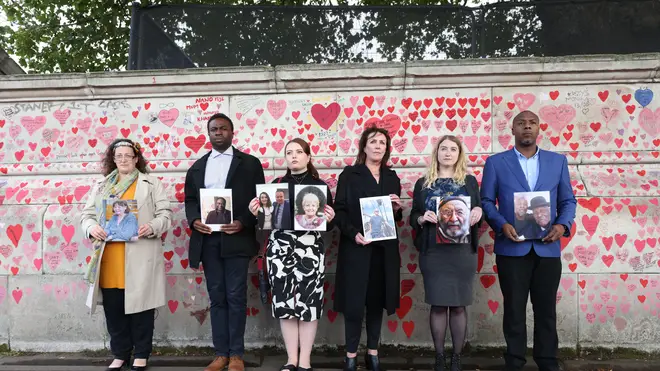
James O'Brien 10am - 1pm
12 October 2021, 23:30 | Updated: 12 October 2021, 23:56

Some of the families of those who died from coronavirus have hit out at a report by MPs for arguing the success of the vaccine rollout "redeemed" the Government despite the fact thousands of people died.
Hannah Brady, spokesperson for the Covid-19 Bereaved Families for Justice group, criticised a passage in the report that said the "success of the vaccine programme has redeemed many of the persistent failings of other parts of the national response such as the test and trace system, so that the outcome is far better than would have been the case without this success".
"What a surprise: a committee led by the previous health secretary and which exclusively spoke to his friends in Government, found that the deaths of 150,000 people were 'redeemed' by the vaccine rollout," said Ms Brady.
Read more: Govt's 'catastrophic' Covid response biggest public health failure in history - report
Watch: Mother 'haunted' by son's Covid death fumes at report findings
She also said the report "manages to barely mention the over 150,000 bereaved families", adding: "Sadly, this is what we expected, as the committee explicitly refused to speak to us or any bereaved families, instead insisting they were only interested in speaking to their colleagues and friends.
"The report it's produced is laughable, and more interested in political arguments about whether you can bring laptops to Cobra meetings than it is in the experiences of those who tragically lost parents, partners or children to Covid-19.
"This is an attempt to ignore and gaslight bereaved families, who will see it as a slap in the face."

Moran: Pandemic report just the beginning of finding truth
Ms Brady said the report proved that a judge-led independent inquiry, which has been promised by the Government in spring, "must have bereaved families at its heart".
She added: "That is the only way that the serious questions, like why families were told their loved ones were not fit for intensive care without medical assessment, or advised by 111 to keep their loved ones at home even in their dying moments, or why there were even more deaths in care homes in the second wave than the first, will be answered."
Read more: 'Why not say sorry?': Minister refuses to apologise for Covid failures eight times
Watch: Covid report co-author: Test and trace system 'real failure' of pandemic
The damming report, published on Tuesday, found that serious mistakes and delays by the Government caused unnecessary deaths and equated to one of the biggest public health failures in history.
It branded the test and trace system "chaotic" and said the UK was unprepared due to a plan modelled on flu and a failure to learn from other countries.
The report, from the cross-party Science and Technology Committee and the Health and Social Care Committee, also found fault with the actions of scientific advisers, saying a policy of "flattening the curve" rather than stopping the spread of Covid altogether was pursued until March 23 "because of the official scientific advice the Government received, not in spite of it".

Iain Dale pushes Tory MP on who is to blame for failings
Appearing on LBC on Tuesday morning, Chancellor of the Duchy of Lancaster and Minister for the Cabinet Office Steve Barclay refused to apologise for findings of the report, despite being prompted to do so eight times by LBC's Nick Ferrari.
"What happened to individual families was obviously devastating… our hearts go out to them," Mr Barclay said, but he added he had not seen the report.
Read more: Covid failure: The key points as damning report claims thousands of deaths were avoidable
Read more: Schoolchildren urged to get vaccinated as one in 15 catch Covid in a week
He said the early days of the pandemic were "unprecedented" and admitted there were lessons to be learnt, suggesting the promised inquiry would be key to finding out what went wrong.
"Doesn't help if you’ve lost grandma, does it? So you can apologise for that?" Nick asked, to which Mr Barclay replied that the Government followed available scientific advice at the time.
"What's so hard about the word sorry?" Nick asked later, to which Mr Barclay gave the same response.